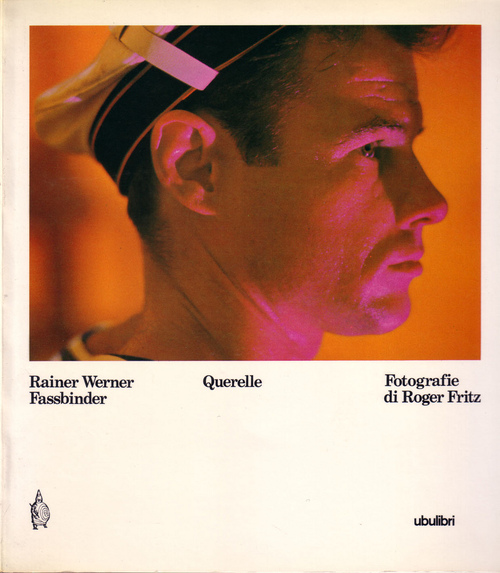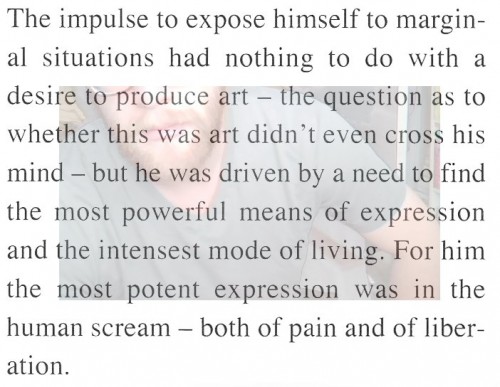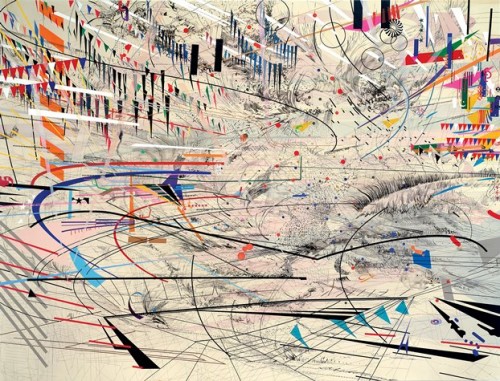Word Spaces
THE ZERO DEGREE NOISELESSNESS OF DEATH: LECTIO V-VIII
LECTIO V: Forget This Memory–Édouard Levé’s Suicide
LECTIO VI: Torture Porn is Capital– Reality & “Solitary”
LECTIO VII: Guy Bourdin’s Spread Legs
LECTIO VIII: The Cinematic Space of Lust
* * * *
LECTIO V: FORGET THIS MEMORY–ÉDOUARD LEVÉ’S SUICIDE
In the constant interstices of urban nomadism, it’s hard to feel like you’re doing anything but travelling. Pummeling towards something: maybe death, maybe the future, maybe in moments of sentimental jouissance, “life,” whatever. By “you” I mean “I,” of course, let’s not get confused quite yet. Life seems like you’re moving forward and then your best friend dies: space is filled with static, it’s OK. I mean, you know, it’s OK.
When I was employed I sat at my office desk and read Édouard Levé’s “When I Look at a Strawberry, I Think of a Tongue,” an excerpt from the author’s soon-to-be-available-in-English Autoportrait (linked recently by Sean Lovelace), four times. Twice in a row. You could read the excerpt and say “this is a list” or you could read the excerpt and say “this is the only thing that makes sense right now.” Knowing I was soon to move, I resisted ordering Suicide, the authors’ only currently available title. A month into my travels-as-life, I said fuck it & ordered the book, having it shipped to the friends’ house I was currently crashing at.
I spend the zone of time considering the impossible. Am I suicidal in my reticence to accept existence? My friend who died did not commit suicide per se, yet his death was a trajectory that he was pushing towards. The void was the pleasure of extreme sex for him. For the dead man in Suicide, we can assume only that the void is static. Escape from life. Is this an extremity?
I cannot consider suicide without reconsidering subjectivity. Personhood. We are bodies and minds and there is either duality or there isn’t (depending on what set of ideas you subscribe to), but, and probably this is where we can find the outside, maybe there are more options. Because I believe in ghosts there is no binary of existing vs. not existing. The inbetween.
When I come back from smoking a cigarette and confidently say, “I’ve been meaning to casually ask you if you’d be interested in tying me up sometime,” am I suicidal? My death drive has been distorted into something that neither exists nor doesn’t exist: rather, it cannot exist. Suicide for utopia. It’s easier to find yourself in the room when there’s no one else in there.
Consider suicide outside of depression. This is where it becomes impossible. Consider the suicide of a man who is literally & physically alone, not existentially, not in terms of inter-personal relationships, not in terms of empathy. Nobody loses. I don’t want to die because there are still things I am looking for. What happens when I find them?
It might just be easiest to melt into the earth. Our world will collapse. The whole thing.
There is an intertextual bit of biography that reviewers are incapable of missing when discussing Levé’s Suicide: 10 days after he gave his editor the manuscript for Suicide, Levé killed himself. I am in love with Levé because he understood something, though I’m not sure what. You have to understand, I am not interested in romanticizing death. Death is not part of the question. Death is not what’s at stake. Life is.
A collective loneliness is the problem, we must become comfortable alone.
* * * *
LECTIO VI: TORTURE PORN IS CAPITAL–REALITY & “SOLITARY”
When I get a head-cold the only way I can escape from the constant awareness that I have a physical body is to throw myself into passivity, primarily by that I mean television. Dismayed to discovered that I was actually caught up with the available streaming episodes of the current season of Project Runway, I started chatting with a friend about reality television. We discussed an interest in a reality TV show built around the concept of making the contestants cry.
Yeah.
But then she revealed that there is a show that almost does this: a brilliant slice of reality-based programming known as SOLITARY. The show finds itself located at some epicenter of capital between the Saw franchise, “Fear Factor,” the Cube trilogy and blatant exploitation. The concept positions 9 contestants in, as the title would indicate, solitary confinement. To an extent– each contestant has communication with “Val,” the robotic overlord that runs the game. The contestants are filmed within their pod through a series of two-way mirrors. Conceptually, this is fucking brilliant.
The game is an exercise in sensory deprivation at first, as our contestants are fucked with by Val, who refuses to let them sleep more then two hours at a time and provides only the bare-minimum of food. A half hour into the first episode I wondered if I was hallucinating, if I had fugued a fever-dream onto my laptop screen. Once the contestants are genuinely uncomfortable, the game begins.
Contestants are put through a series of what could arguably be defined as either “exercises in torture” or “fucked up psychological experiments.” Sleep deprivation is amped up the added obstacle of having to remember a constantly changing numerical code which shuts off an alarm, contestants have to eat various food until either they give up or vomit, contestants must spin in chairs, contestants must endure aural assault, contestants must lie upon a bed of muted nails until they can no longer take the pain and irritation, contestants must sit in a small box as the walls close in.
Between the literal challenges (“treatments” in the game’s lexicon), robotic Val attempts to probe the psychology of the contestants in order to, I don’t know, moralize or fuck with them or act as therapist. This element is somewhat superfluous and annoying, as all of the contestants lack any sort of probable depth. This is not a problem to me in terms of “contestant as character,” but the amount of time spent proselytizing and playing amateur psychologist causes a real eye-roll.
What’s interesting to me about this show is the following: I loved watching this. There is an ultimate futility when we consider the fact that aside from the winner of the ‘game’ getting rewarded $50,000, the show’s production values seem relatively upscale, which speaks of the fact that a relatively insane amount of money went in to producing this show. Capitalism is completely fucked.
* * * *
LECTIO VII: GUY BOURDIN’S SPREAD LEGS
Yesterday I went to SFMOMA with a friend. We were attempting to see Adam Pendleton & Deerhoof’s “re-imagining” of Godard’s Sympathy for the Devil, but it turns out we had our dates wrong and that doesn’t happen until next week. Unfortunately we didn’t realize this until we had already bought our tickets and wandered inside. Fortunately it was late enough in the evening that our entrance had been half the cost it would have been earlier in the day. So we just wandered the collections.
I am, often, a quiet person in most social situations. However, if I am at an art museum that features an impressive collection of late-modern & contemporary art, I talk a lot. I’m often bitchy, often really excited, always focused and slightly manic. I say things like, “God, neither Johns nor Rauschenberg made anything interesting before they started fucking.” I talk mad shit about representational landscapes. I complain about how boring contemporary photography can be. The point is: it’s likely that you don’t want to go to an art museum with me.
Some things shut me up though. Certain parts of the long history of Western art are holy to me. Obviously. Art really is more important than basically anything else to me, and of course what I include under the umbrella of the term “art” is certainly not limited to traditionally considered visual art. Right now at the SFMOMA there’s a beautiful Julie Mehretu up on the top floor. The hyper graphic nature of her work is enveloping. I said to my companion: “This is the only kind of representation I want in the world.”
My degree is in photography. Despite my obsession with finding and devouring art, I could probably list the photographers I truly admire on a single hand. My obsession with the image–specifically the photographic image–finds me even harder to please than normal within this realm. However, those five or so photographers I love beyond dearly.
In my limited experience at the SFMOMA, it seems that the second or third floor is generally dedicated to one or two photography shows, which is nice, because it draws in more contemporary work and really provides a lot to look at. Because I’m so hard to please, I need a very large pool to be looking through before I find satisfaction.
Ah, but then I turn the corner, and I’m greeted with something akin to holiness. That is, there are three giant Guy Bourdin prints on the wall. Bourdin is one of the chosen few in my canon, he is the master of the image, he knows narrative and mood and beauty, mystery.
Guy Bourdin is my favorite photographer. I have seen something like 4 large prints of his work now, all in San Francisco. I have read, cover to cover, all of the monographs available on his work. He is a hero. He is a god. However, staring at three prints on a wall, I realize that there’s an imperfection in this arrangement: throughout his life, Bourdin never exhibited his own work. He worked exclusively for fashion magazines. He invented the creative syntax of the two-page spread. He understood turning a page– he understood the way the book works. His images, beautiful on their own, function best within the context of the book. He understood that his medium was not only the camera, his medium was the fashion magazine.
This lesson of Bourdin’s is an important lesson to remember.
* * * *
LECTIO VIII: THE CINEMATIC SPACE OF LUST

At the bar last night, Elvira from Fassbinder’s In a Year With 13 Moons showed up. Blonde, younger, slimmer. I love San Francisco. This is summer time.
I watch Fassbinder’s Querelle and realize there will never be a more fully realized zone of lust on the screen. There is nothing outside of Fassbinder’s diegesis, everything is present, beautiful, and packed with desire. Watching Querelle is like orgasming for almost two hours. My eyes see colors and my heart beats.
I go home with a guy after a party at a different bar. We are naked in bed watching Ingmar Bergman’s Persona. Before we start fucking I turn away from the screen, look at the guy, and say, “I had completely forgotten how intense this movie is.” Our cinematic desire grabs to turn the TV off. In darkness new images flicker on eyelids.
The space of cinema is lust. Our bodies are not signifiers on a screen but narrative can still be found. Images are everything. Life.
Tags: capitalism, Death, Edouard Leve, fassbinder, flickering lights, guy bourdin, julie mehretu, lectio, querelle, realty, silence, solitary, suicide, the image






fuck tyler the creater
SF is loving you back. Really love these posts MK.
Thanks John, I appreciate it.
This is my favorite post you’ve written yet.
Thanks!
These are incredible. I love these so much.
Thanks, totally appreciate the kind words.
does ne1 know if, like, death is, like, totally noiseless….? ne1??
also, capitalism is EFFED BRO (re solitary)
*salivates all over white cube abstractionist who sells paintings for millions of dollars*
who the fuck likes paintings?
i do
I love this. I miss you.
[…] I-IV Lectio V-VIII Systemic limits to growth require that the inevitable recommencement of the solar trajectory […]